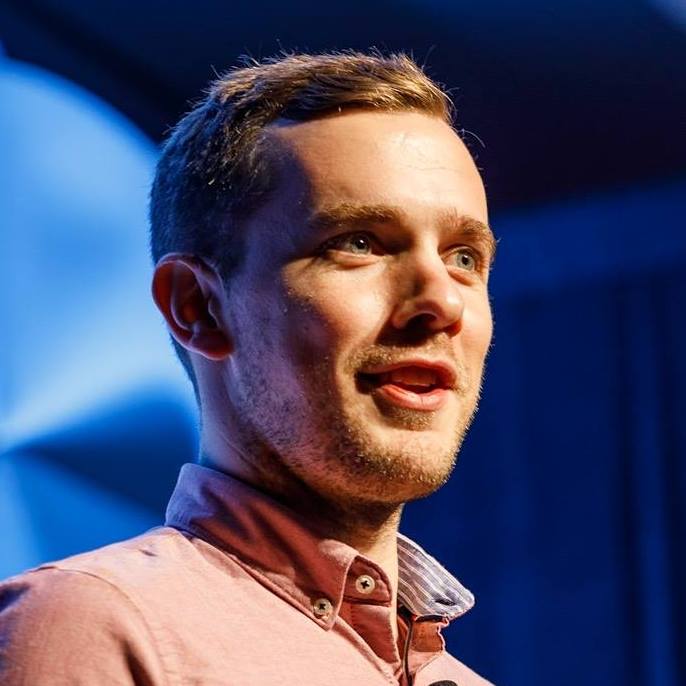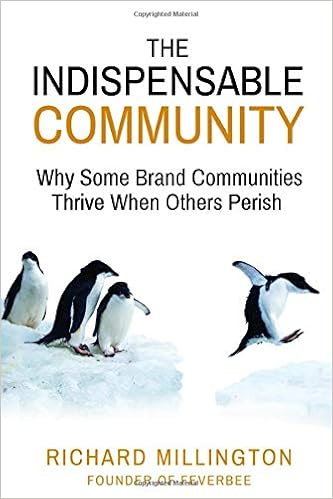Feverbee founder and return podcast guest, Richard Millington has spent over a decade helping hundreds of companies around the world develop successful, indispensable communities.
He is also an international speaker and author of Buzzing Communities: How To Build Bigger, Better, And More Active Online Communities and The Indispensable Community: Why Some Brand Communities Thrive When Others Perish.
In this episode of the Leading Learning podcast, Jeff talks with Rich about the evolution of online communities and ways the current pandemic is impacting them. They also discuss the relationship between virtual events and online community and Rich shares specific and practical tips about how to successfully launch and grow a community.
To tune in, just click below. To make sure you catch all of the future episodes, be sure to subscribe by RSS, Apple Podcasts, Spotify, Stitcher Radio, iHeartRadio, PodBean, or any podcatcher service you may use (e.g., Overcast). And, if you like the podcast, be sure to give it a tweet!
Listen to the Show
Read the Show Notes
[00:18] – A preview of what will be covered in this episode where Jeff interviews Richard Millington, founder of Feverbee and author of Buzzing Communities: How To Build Bigger, Better, And More Active Online Communities and The Indispensable Community: Why Some Brand Communities Thrive When Others Perish.
Reflection Questions

[01:55] – You might consider the reflection questions below on your own after listening to an episode, and/or you might pull the team together, using part or all of the podcast episode for a group discussion.
- How well are you cultivating and leveraging the relationship between online community and virtual events in your learning business? What might you do to better connect the two and help generate more overall value for your learners?
[02:53] – Introduction to Rich.
[03:57] – Rich shares some additional background information about his work at FeverBee saying they help organizations build the best communities that they possibly can. And how this heavily involves using principles of psychology.
Defining “Community”
[04:38] ‑ To make sure that we and the listeners are on the same page, what do you mean when you use the term “community?”
Rich shares there are two definitions that tend to work well (and it depends on your perspective):
- A group of people who develop strong relationships around a common, shared interest. (This definition is very specific.)
- A group of people who interact with each other online. (This is the broader definition that Rich thinks is more common today.) With this, they might not have the same strength of relationships, but the people are there and contributing—even if they’re just watching and listening.
The Impact of COVID-19 on Online Communities
[06:28] – How has the current situation with COVID-19 been changing things in the online community world? Has there been greater demand for/participation in online communities?
Rich explains that there’s no single answer and it really depends on the community.
The communities around more general topic areas (sites like Reddit or Stack Overflow) are seeing a surge in activity.
But the typical brand communities are seeing a decline in the level of participation, especially those that are related to products that you buy or sell.
Rich says what’s really interesting though, besides just the level of participation, is the type of participation.
The level of innovation we’re seeing now—in the way that events are going online, in the way that people are engaging and participating in brand new ways—is so exciting. If there are any green shoots from this terrible situation, it’s the sheer level of innovation that’s taking place in some of these communities.
He thinks we’re seeing an incredible level of innovation, especially with events. And that we haven’t even scratched the surface with what’s possible with events at the moment (especially on tools like Zoom or Slack).
Rich also thinks we’re going to see new communities and technologies that are being formed today that are going to perpetuate long after this is finished.
Live Video Interactions vs. Forum Discussions
[09:10] – Are you seeing a lot of effort to connect something like Zoom (an online, live, video-type interaction) to a traditional community-type platform (such as Higher Logic, to name a specific platform)? It seems to me you’re getting all the pieces of what might be a big conference-type event where there’s a lot of networking, and then you do also have the live sessions where education and keynotes are being delivered. Are you seeing that type of thing going on a lot now?
Rich says to a certain extent he is, but he doesn’t think a lot of the larger organizations using platforms like Higher Logic have really quite gotten to where they need to be.
For him, what’s exciting is the people who are building these communities from scratch using very cheap tools like Zoom and Slack.
And forums will always have their place—if you want to document knowledge or a discussion where you can see the history of that discussion and want to be able to search for that information—then forums are fantastic for that.
But in terms of getting people together and sharing an experience right now, in terms of sharing what we learned today, in terms of what we plan to do tomorrow, Rich says tools like Slack and Zoom combine so well together and he’s really excited about that. But also most people haven’t even scratched the surface with what you can do with Zoom yet.
On the forum side, Rich thinks they definitely have their place but a lot of the discussions that are taking place right now seem to be more related to live discussions—in the moment, how people feel and how people think. Rather than the more forum-based discussions that are along the lines of what works, how to solve a situation. So there’s a different type of interaction and different type of intent and motivation.
But he believes both [the live interactions and forum-based discussions] can coexist well.
The Evolution of Communities
[12:27] – You’ve been doing this – i.e. working with organizations to build communities – for many years now—you started FeverBee in 2008. How have things evolved with community since then to where they are now (COVID aside, so a few months ago before the pandemic)?
Rich talks about how 2008 was the golden age of enterprise platforms and forums that were all emerging around that time. And all of the big vendors were launched in the couple of years before or after that. Then with the rise of social media from about 2010-2016, a lot of the communities moved into the social media space.
He remembers there was kind of a feeling that’s where everything was going (to Twitter, Facebook, Instagram, etc.)—but he doesn’t think that happened.
Rick acknowledges this happened to a certain degree, in certain kinds of groups and communities. And that there are certain situations and sectors where people build a community on a platform that already exists (like Reddit or Facebook).
But forums have tended to find their own place in specific sectors where they are integrated into the entire experience that someone has.
Generally speaking though, Rich says this is different for every sector. And associations seem to be in their own space to a certain extent where a lot of them have a standard platform they’ve been using.
One of the really interesting things that’s happening in the last few years, Rich explains, is that people don’t connect their identity so much to a standalone platform that they might be a part of.
It used to be that online communities were your identity and you’d spend ages setting up your profile. But that’s generally moved to social media now. The same people that connect with each other on a hosted, online community or specific platform, also now connect on Twitter, Facebook, etc. And that’s where they create and maintain their identity.
Rich explains this is important because we can spend time talking about profiles in a community and how people behave, but more and more, people want to show off what they’ve done in the community, outside of it (Twitter and other channels). They want to maintain their identity and be recognized as an expert there.
So Rich thinks social media is going to continue to have a big impact.
He also discusses the rise in group chat over the last few years as another trend. A lot of the discussions that would take place in a community, now take place in a private, WhatsApp group. And this is in almost every sector that he can imagine.
In fact, even in the community space right now, Rich says there’s a private WhatsApp group for some of the known people in the space where they can connect and share advice with each other.
The need for privacy and exclusivity, where you can ask questions and be vulnerable to a smaller audience is quite powerful.
Rich says there are a lot of different things going on, some of it being driven by technology, but most of it is driven by the way we’re changing and how our needs are changing as well.
 Tips to Starting an Effective Community
Tips to Starting an Effective Community
[17:15] – For a group who wants to start a community—and to narrow it some, let’s say it’s some sort of membership-type organization, maybe an association or a company with a subscription model—what are some standard tips you would share to help get them started and get momentum going?
If you don’t have much experience building community before, Rich recommends a couple of things he thinks are really important:
First, begin with a small, core group of founding members.
The temptation when you launch a community is that you might invest heavily on a platform and then want to invite everyone to join it and to start participating.
But he stresses that big bang launches just don’t work.
And even if they did, you wouldn’t be prepared for that level of activity. It takes time to build up the skills and resources to handle that level of participation.
So start small (a few dozen seems to be the sweet spot), and find a really tiny niche and then make sure that you can satisfy their interest and needs better than anywhere else.
Figure out why people would come to your community and what the problem is that you’re solving for them.
Rich suggests that you get very specific by interviewing this core group and spending time with them to really personify what their needs are and build the community around that.
Initially, he recommends starting with something that’s inexpensive to use (such as Mighty Networks, Facebook groups, WhatsApp, Slack, etc.)
Then as you grow and start to burst at the seams in terms of the level of participation, then you might want to move to a different platform (such as Higher Logic).
Once you start to grow, then Rich says you can figure out who the top members are and start building out a specific program just to help them. And he notes they are usually most motivated by access—access to you, access that other people don’t get.
Then, Rich suggests that you continue building out that program gradually—don’t try to have a mass rush of activity and make sure it works as a small community before it becomes a big community. So then you can invest more in technology as it grows, instead of a massive upfront investment.
At this stage, as you go from say, 50 to 100 members, you can start looking at creating content, newsletters, digests, etc. You want to figure out what the toughest challenge is that your audience has and then start discussions, questions, and live activities so people can solve those challenges in that community.
Rich further recommends that you try to have a series of milestones in place (things that you’ve achieved, things that are coming up, things that the community can contribute on together) so there’s always a sense of momentum.
And don’t be shy of sharing the success stories from the community, with the community.
Finally, he challenges you to try and figure out what each person can contribute to that community.
Every single person in your community has skills, experience, resources, or a perspective that they can contribute to it—even if somebody is new to the topic because they can ask questions that will help the next person new to that topic.
If you design it right, Rich stresses that everyone can contribute productively to that community.
And the more that your members feel like they are making a unique, useful contribution to that community, the more they will continue to participate.
Note that FeverBee offers some excellent training options around growing and running a community and Rich’s blog is another helpful resource to check out.
And check out the below for additional insights on how to build a successful community and get the most from your members,
Relationship Between Community and Learning
[23:17] – We’re hearing more these days about lifelong learning, and about related concepts like learning in the flow of work or learning in the flow of life. How do you view the relationship between community and learning?
Rich discusses how in every single action in a community, people are learning more about the topic, each other, what the social norms of that group are, and what people like themselves do.
Communities are the ultimate source of learning. You can study something on your own but if you do it as part of a group, you’re going to learn so much more. There’s so much knowledge that’s in a community that you can’t search for on the Internet.
He talks about how communities not only offer you the informative side of solving a problem, but the emotional side as well.
And communities are fantastic at bringing out a level of expertise and experience that you just can’t get anywhere else.
[28:20] – What is one of the most powerful learning experiences you’ve been involved in, as an adult, since finishing your formal education?
Rich shares that it would be any situation where he’s being fully immersed in the topic, such as when he learned to speak Lithuanian. So, just fully immersing himself in something, rather than going to a class, helps him learn so much. He also says that learning a new skill is one of the best feelings he’s ever had.
[30:34] – How to connect with Rich and/or learn more about FeverBee:
- Website: https://www.feverbee.com
- Twitter: @RichMillington
[31:19] – Wrap-Up
Reflection Questions

- How well are you cultivating and leveraging the relationship between online community and virtual events in your learning business? What might you do to better connect the two and help generate more overall value for your learners?
If you are getting value from the Leading Learning podcast, be sure to subscribe by RSS, Apple Podcasts, Spotify, Stitcher Radio, iHeartRadio, PodBean, or any podcatcher service you may use (e.g., Overcast) as it helps us get some data on the impact of what we’re doing.
We’d also appreciate if you give us a rating on Apple Podcasts by going to https://www.leadinglearning.com/apple. We personally appreciate your rating and review, but more importantly reviews and ratings play a big role in helping the podcast show up when people search for content on leading a learning business.
Finally, consider following us and sharing the good word about Leading Learning. You can find us on Twitter, Facebook, and LinkedIn. We also encourage you to use the hashtag #leadinglearning on each of those channels. However you do it, please do follow us and help spread the word about Leading Learning.
[33:07] – Sign off
See Also:



 E-Learning Uncovered with Diane Elkins
E-Learning Uncovered with Diane Elkins
Leave a Reply